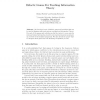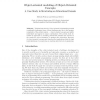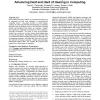ISSEP
2010
Springer
14 years 8 months ago
2010
Springer
ISSEP
2010
Springer
14 years 8 months ago
2010
Springer
ISSEP
2010
Springer
14 years 8 months ago
2010
Springer
We developed a set of didactic games and activities that can be used to illustrate and teach various concepts from Information Theory. For each of the games and activities we list ...
ISSEP
2010
Springer
14 years 8 months ago
2010
Springer
Teaching introductory object-oriented programming presents considerable challenges. Some of these challenges are due to the intrinsic complexity of the subject matter — object-or...
SIGCSE
2009
ACM
15 years 13 days ago
2009
ACM
We have developed a CS1 curriculum that uses a robotics context to teach introductory programming [1]. Core to our approach is that each student has their own personal robot. Our ...
SIGCSE
2009
ACM
15 years 13 days ago
2009
ACM
Dynamic memory management and the use of pointers are critical topics in teaching the C++ language. They are also some of the most difficult for students to grasp properly. The re...
SIGCSE
2009
ACM
15 years 13 days ago
2009
ACM
Deaf and hard of hearing students are an underrepresented group in computing and face extra challenges in university-level computing courses. This paper describes a 9-week Summer ...
SIGCSE
2009
ACM
15 years 13 days ago
2009
ACM
GINI (GINI Is Not Internet) is an open-source toolkit for creating virtual micro Internets for teaching and learning computer networking. It provides lightweight virtual elements ...
SIGCSE
2009
ACM
15 years 13 days ago
2009
ACM
In the quest to find instructional approaches that benefit student learning, engagement, and retention, evidence suggests providing students with hands-on practice is a worthwhile...
SIGCSE
2009
ACM
15 years 13 days ago
2009
ACM
We describe cs1graphics, a new Python drawing package designed with pedagogy in mind. The package is simple enough that students can sit down and make use of it from the first day...



